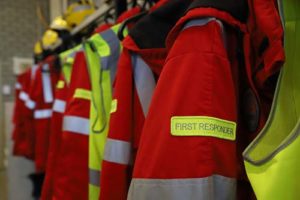 What is a first responder? A first responder is someone who is designated or trained to respond to an emergency. This can include firefighters, law enforcement officers, paramedics, and EMTs. But, as any first responder knows, this is not an ordinary occupation. It requires extensive training, the ability to keep oneself calm in the midst of a crisis, and an unwavering dedication to helping those in need. While first responders are unquestionably strong, they are still human and susceptible to the same mental health issues as everyone else.
What is a first responder? A first responder is someone who is designated or trained to respond to an emergency. This can include firefighters, law enforcement officers, paramedics, and EMTs. But, as any first responder knows, this is not an ordinary occupation. It requires extensive training, the ability to keep oneself calm in the midst of a crisis, and an unwavering dedication to helping those in need. While first responders are unquestionably strong, they are still human and susceptible to the same mental health issues as everyone else.
At Peer Mental Wellness, we offer a variety of mental health treatment programs for first responders in Los Angeles so that they may get the most out of living a positive and healthy life. Regardless of whether a client is experiencing depression, post-traumatic stress, substance abuse, or suicidal ideations, the Peer Mental Wellness team is experienced, well equipped, and dedicated to the recovery of every individual that walks through the door.

Mental Health Treatment for First Responders
It is not hard to imagine how the responsibilities of first responders can take their toll on mental health. In addition to having to work in high-stress/high-stakes situations, first responders must do so regularly, often with little time to process one event before being called to another. Common reasons for first responders seeking outpatient mental health treatment include:
Depression: Depression is a common issue among first responders. Depression is characterized by persistently depressed mood and or loss of interest in relationships, activities, and social engagement.
Stress and post-traumatic stress disorder: Stress naturally comes with being a first responder. However, if signs of stress continue, it may signify something more. Post-traumatic stress disorder (PTSD) is another widely reported issue among first responders. It is a condition that occurs in people who have witnessed or experienced a traumatic event such as a serious accident, violence, or death. Symptoms include intrusive thoughts/vivid flashbacks, avoidance of traumatic reminders and triggers, alterations in mood and cognition, nightmares, and heightened reactions.
Substance abuse: First responders regularly come face to face with the kind of incidents that most of us hope to avoid our whole lives. Because of the stress caused by this kind of work, substances and alcohol become a natural avenue of relief for those in pain.
Suicide/suicidal ideations: Due to the environments in which they work and the unpredictability of the situations in those environments, first responders are at a higher risk of suicide and suicidal ideations.
The stress and pressures of this job are unlike most occupations in the world. That is why mental health treatment should be considered by all first responders who feel they could use help.

Emergency Responders and Mental Health Treatment in Los Angeles
A day in the life of a first responder can be, to say the very least, stressful. This is because of what is demanded of first responders. They must react quickly in high-stakes situations, complete complex tasks while under stress, and run headfirst into danger without a second thought. This job is stressful, physically demanding, and emotionally taxing.
However, it can be hard for first responders to seek help when it’s needed. There is a natural and well-earned sense of pride and accomplishment that comes from being able to help people in need. However, there is also a stigma within the first responder community against seeking help for themselves. Many believe that admitting they need help could impact their employment or make their colleagues believe they are unfit for duty. It is for these reasons, in addition to many others, that any emergency responder seeking mental health treatment in Los Angeles take the necessary steps to get the help they deserve.
Discover Emergency Responders’ Mental Health Treatment in Los Angeles at Peer Mental Wellness
The Peer Mental Wellness team is committed to their participants’ recovery and rehabilitation. For more information about our outpatient treatments including our intensive outpatient program and our partial hospitalization program, contact us at 714.844.5473.



